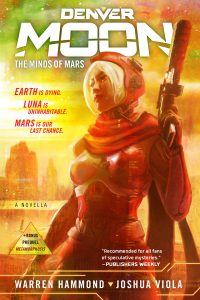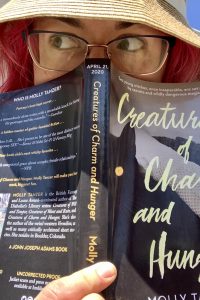Roundtable: Heinlein Juveniles Then and Now
Karen Burnham
While I was away I ran a series on the Blog about science fiction for children, everything from age 0 (picture books) to around age 10 (middle grade, I’m told). The parents and kids contacted came up with some great responses, some of which I’ll be looking to order from the UK and Australia! However, we got a significant number of comments asking why we weren’t talking more about the Heinlein juvenile novels.
Henlein wrote those books about 60 years ago, and the great man himself has been dead for 20 years. I’m a hard-core sf reader in my 30’s, and I never read any of the juveniles by either Heinlein or Asimov. This is probably me being grumpy, but isn’t it time we moved on? Or are these books, written for the youth of the 1950’s, still of worthwhile importance for today’s young readers?
As always, this discussion is broken up into multiple pages for ease of reading. If you’d like to read it all on a single page, select ‘View All’ from the drop down menu above. If you don’t see the drop down menu, please click here.
Stacie Hanes
I read them (though as an adult), and I think they are still of value.
And my 13-year-old son, Anson, has read at least a few of them. Probably his name is a giveaway re what sort of reading material I have provided him, but he has enjoyed Space Cadet, Have Space Suit—Will Travel, and had picked up The Rolling Stones to read next (after he finishes Un Lun Dun, because he’s coming with me to ICFA and wants to read a Mieville).
He especially likes books about space, and Heinlein does that pretty well.
Cecelia Holland
I generally hated juvenile literature when I was a juvenile. I remember loving Double Star (I would have been 12) and reading it twice in a week.
Karen Burnham
I’m with Cecelia–when I was around 12, I jumped right into ‘adult’ genre literature with Heinlein/Clarke/Asimov and (I was young, forgive me) Piers Anthony. I remember enjoying Friday, Childhood’s End, and the I, Robot collection around that time. From before that the only genre literature I remember reading were classics such as the Hobbit and Narnia, plus A Wrinkle in Time–all of the Madeleine L’Engle books were favorites of mine through elementary school.
Jeff Ford
I never read the Heinlein YA stuff, but then I never read much of the Heinlein adult stuff. I’m not sure it’s time to “move on” from them. That’s something kids will have to decide. When I was 11 or 12, the stationary store downtown had a spinning rack loaded with Ace doubles. Compared to those, the Heinlein YA stuff looked dorky. Also Doc Savage loomed large. They were pretty much schlock, but I remember thinking the covers were awesome. I could never get into that Wrinkle In Time stuff when I was a kid either. Kids who are readers know the best books aren’t the ones that adults suggest, but the ones they find on their own and the ones other kids tell them about.
Click here to continue reading.






I appreciate this discussion. Heinlein’s “Space Cadet” is the fulcrum on which my life swung—everything I’ve done since is in some way reflective of having found it and read it when I was ten. The Messiah had arrived, so to speak. So I suppose there’s some justification for the notion of “gateway” books.
But would it work its magic for younger readers? The Heinlein juveniles are old—they’ve been dated by the march of time. They’re not as easy to find as they were in my day. Other books clamor for attention. It’s “their grandparent’s science fiction,” on the other side of the generation gap.
So I don’t know.
(By the way, lets give a hand for Marguerite Henry. She wrote a series of juveniles, mostly involving horses. And if I hadn’t read through her stuff and, while looking for more on the school library shelf, I wouldn’t have wandered over a couple of books to where Robert A. Heinlein was shelved.)
I was born in 1968 and my exposure to science fiction from raiding my uncle’s bookshelf was coupled with Cold War scares and the progress that NASA appeared to be making. So I certainly grew up with the certainty in my head that by the time I was older we would be flying vipers like they did in Battlestar Galactica; that we would be out amongst the stars. I really had no doubts. Until I hit my later teen years and saw the beginnings of NASA’s slow halt to where we are at today.
I am a big fan of the Heinlein juveniles. I read my first one in my 40’s. My consumption of “golden age” science fiction has almost entirely taken place in this past decade. When I read these books a big part of what I look for and pull out of them is that feeling of nostalgia that reminds me of being a kid and having dreams of space travel. The things that people often complain about: the lack of good science, the predictions that didn’t come true, the inability to predict things like the internet, personal computers, etc. are the things I enjoy in these books. I like seeing what people thought might happen in their future, now our present. I don’t mind when they missed it if the story is entertaining. The whole idea of the story being “dated” is part of its charm and appeal.
I’ve been enjoying the conversation here but still have A LOT of it to get through. Good stuff. I don’t always agree with the idea of even having the “relevance” conversation, because I don’t often think it is well defined. Science fiction fans often talk about SF needing to be relevant, but the reality is that science fiction is only relevant to science fiction fans in the first place, a group of fans that I would suspect the greater group of fiction fans find aren’t relevant in the first place. And of this smaller group of “fringe” readers, I often think it is funny that “we” argue about which types of SF are relevant and which are not.
I guess I need a better definition of “relevance”, to which my response still might be, “outside of SF fandom, SF isn’t relevant to anyone, so what purpose does “relevance” serve?”. I say that somewhat facetiously, because I do think all forms of fiction should at the very least have some personal relevance for the person reading the book. But is greater relevance something SF should strive for? I don’t know.
As for RAH, the only “facts” I can lay claim to is that his juveniles bring a thrill to this 42 year old adult male, and one of my close friends has read several of these to his pre-teen son and teenage daughter over the last couple of years and they really have enjoyed them too. So for us in our small world, Heinlein is very, very relevant.
Jeff brings up an excellent point. The educational system has a lot to answer for in terms of disenfranchising students from reading. When my son was five, he loved to read. Then he hit a stretch in school where he had to read a book a day and pass a test on it. We were in the process of moving at that time, and I had moved for job reasons while my family had not yet followed. If I had been there, I would have told the school they could fail him if they wanted, but I wasn’t going to require him to participate in an activity that would make him hate reading. Ever since then getting him to read has been a constant frustration.
You are right, Keith, Jeff Ford’s point is very well taken. There are creative ways to get kids to read, even classics, and if schools would step away from pre-planned lessons and formulas and would instead treat children as individuals I think they would find kids reading a wide range of books, would find more kids develop a passion for reading, and would see an increase in learning, test scores, etc.
Wow- thought I was the only Heinlein fan still alive- read them in the 50s in elementary school and then into the adults but always loved the juvies best. Favorite was Have Spacesuit Will Travel-
I read most of the RAH juveniles when I was in 7th-8th grade (in the early 70’s, so they were already “dated” by then) and deeply loved them. In any case, RAH still seems relevant if the question of his irrelevance can prompt seven pages of passionate comment…
Thomas – Fair point! There’s something about Heinlein that never fails to spark comment.
I entered fantastika through parallel streams of both juvenile and adult SF. I tore through the Heinlein juveniles as a high school freshling (1980) even as I was being given Le Guin and Delany by my mentor. I was a voracious reader and re-reader; I re-read Space Cadet so much that it became my nickname because I was always carrying it around. Then, as an isolated, anxious, torn-between-worlds teenager, Heinlein had a lot to offer, as a gateway to other works and ideas if nothing else. Relevant today? Perhaps, but I’m with Jeff Ford on the idea that kids will seek out and find the stuff they need, if we give them the chance and the encouragement.